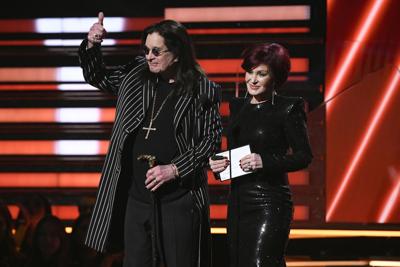Recently, I came across a bit of screenwriting advice that goes something like this: all endings should be both surprising and inevitable. These words crept to mind on Tuesday, when I learned of the passing of Ozzy Osbourne at age 76.
News of the death of Osbourne, a pioneering heavy metal singer who redefined pop culture (at least twice over and maybe three times), brought a sense of a shock and acceptance. Ozzy lived both hard and well. He too was surprising and inevitable.
Born in 1948 in the English industrial town of Birmingham as John Michael Osbourne, OzzyŌĆÖs beginnings were inauspicious. As a working class ŌĆ£Brummie,ŌĆØ his career prospects were limited to tool maker, meat packer or car-horn tuner ŌĆö the latter being about as close as someone of his stock could imagine to a career in the music biz.
An encounter with the Beatles changed that. A teenage Osbourne hooked up with local musicians Tony Iommi, Bill Ward and Terrance ŌĆ£GeezerŌĆØ Butler to found the group Black Sabbath ŌĆö and heavy metal itself.
Pulling equally from the paranormal and the predominant English blues rock sound ŌĆö new listeners to the bandŌĆÖs 1970 debut might be surprised to hear just how much honking harmonica it contains ŌĆö Sabbath turned the flower power vibes of ŌĆÖ60s rock upside down. Peace, love and smiling on one’s brother were replaced by doom, gloom and a sinister vibe that (at least in hindsight) offered a more honest appraisal of the nuclear era. They were counter-counterculture.
ŌĆ£Who gave a dogŌĆÖs arse about what people were doing in San Francisco, anyway?ŌĆØ Osbourne wrote in his 2009 memoir “I Am Ozzy.” ŌĆ£I hated those hippy-dippy songs, man.ŌĆØ
With OzzyŌĆÖs wailing, urgent lyrics juxtaposed against Iommi and ButlerŌĆÖs heavy riffing, Black Sabbath set a new template for rock ŌĆÖn’ roll. They were the fathers of heavy metal, whether they liked it or not (Osbourne himself rejected the term). The form was harder, weightier and altogether darker.
It was further honed in the U.K. by bands like Witchfinder General, Judas Priest and Iron Maiden, and in America by the likes of Metallica, Slayer and Pantera.
Ozzy sang (or howled) about the apocalypse, drug abuse and shadowy figures lurking at the edge of the bedside ŌĆö topics that inspired generations of heavy metal fans and practitioners, and raised the ire of just as many generations of concerned parents and church groups. Osbourne himself would long hold the moniker ŌĆ£Prince of Darkness,ŌĆØ a nickname he shared with no less than Lucifer himself.
Ozzy was arguably as legendary for his music as the antics surrounding it.
A prodigious consumer of alcohol and illegal narcotics, his erratic behaviour drove tension in the group. By 1979, Osbourne was dismissed from Sabbath. Undaunted, he began a lucrative solo career.
If Sabbath defined the sound of ŌĆÖ70s heavy metal, OsbourneŌĆÖs solo band brought it into the ŌĆÖ80s: bleached hair, dive-bomb guitar solos and all. The music made Osbourne a superstar of the MTV era and one of the select few artists to be inducted into the Rock and Roll Hall of Fame twice, alongside his heroes, the Beatles.
Naturally, this new fame bred more controversy.
In 1982, Ozzy drew headlines after biting the head off a bat while performing onstage. In ŌĆÖ85, he and his label were sued by grieving parents, who claimed their 19-year-old son took his own life after listening to OsbourneŌĆÖs ŌĆ£Suicide SolutionŌĆØ (a judge ruled that the lyrics were protected speech under the U.S. First Amendment). An appearance in the 1988 documentary “The Decline of Western Civilization Part II: The Metal Years,” showed a jittery Osbourne, wide-eyed and wiped out, struggling to make breakfast in his kitchen.
OzzyŌĆÖs chemical dependencies would become the stuff of not only heavy metal myth, but pop culture fodder.
In 2002, MTV premiered “The Osbournes,” an early reality-TV hit that followed Ozzy and his family: wife (and manager) Sharon, daughter Kelly and son Jack. (Sharon and OzzyŌĆÖs eldest daughter refused to participate.)
A smash, the show offered a fly-on-the-wall look at the Prince of DarknessŌĆÖs relatively humdrum life. Here was the debauched metal icon who bit the head off a bat struggling with the satellite remote. Even judging by the standards of a debased medium like reality television, “The Osbournes” seems gallingly exploitative today. His music made Ozzy an icon. The TV show made him a punchline.
Such ignominies did little to diminish OsbourneŌĆÖs reputation in musical circles, however.
Ozzy eventually committed to sobriety. For years he had suffered tremors, which were written off as the effects of alcohol abuse. As it turned out, they were likely symptoms of ParkinsonŌĆÖs disease, a diagnosis he revealed in 2020.
Just a few weeks ago, Black Sabbath reunited for a final show in Birmingham, joined by a cohort of heavy metal and hard rock icons ŌĆö members of Metallica, Slayer, Judas Priest, the Smashing Pumpkins, Alice in Chains, Guns NŌĆÖ Roses and more ŌĆö who paid their respects to the group. It was billed as a final farewell. Now it seems like a living wake.
Onstage at BirminghamŌĆÖs Villa Park Stadium, a considerably diminished Osbourne sat in a throne befitting rock ŌĆÖnŌĆÖ roll royalty, performing several solo songs and numbers with his Sabbath bandmates. He closed the concert ŌĆö and, as it would turn out, his storied musical career ŌĆö with ŌĆ£ParanoidŌĆØ from SabbathŌĆÖs 1970 album of the same.
Listening to it now, the track is at once urgent and sorrowful, surprising and inevitable. Its final lines ring like a cri de coeur from an artist whose altogether untimely passing is betrayed by the fact that he lived, in his 76 years, the lifetimes of several more men:
And so as you hear these words
Telling you now of my state
I tell you to enjoy life
I wish I could, but itŌĆÖs too late






























To join the conversation set a first and last name in your user profile.
Sign in or register for free to join the Conversation